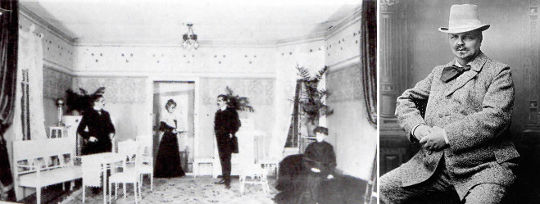 |
|||||
|
|
WORLD PREMIERE
Sweden's greatest modernist playwright, August Strindberg, returned from the Continent to Stockholm in 1906, where he lived out his last seven years. There he wrote "The Pelican" for his Intimate Theater in 1907 and "Isle of the Dead" (Toten-Insel) immediately after as a prologue. The latter was unpublished until 1918 and rediscovered in the early 60s, when it was found and promptly dismissed as an incomplete fragment. The two plays were finally reunited by Ingmar Bergman in a radio version in 2003. It was his last dramatic production. From February 6 to 22 August Strindberg Rep, a resident company of Theater for the New City (TNC), brought the two plays to the stage together for the first time in history. It was also be the world premiere of new English translations of both plays by Robert Greer, Artistic Director of Strindberg Rep, who helmed the production.
In "Isle of the Dead," a middle-school teacher who has died in his sleep wakes up to find an enlightened spirit sitting next to him. This spirit tries without success to explain to the teacher that he no longer need concern himself with such mundane matters as grading papers before class. Finally, the spirit instructs the benighted teacher to watch a play with him. The play is "The Pelican."
In "The Pelican," a vivacious young widow has eyes for her newly-married son-in-law. The moral turpitude of it is driving her son to drink. Throughout her children's lives, the widow denied them food and firewood, unwilling to "squander" money that she is actually stealing for herself. The son finds a letter from his late father recounting her cruelty -- how will he avenge her betrayal? The play's title comes from an erroneous myth of nature: the mother pelican feeds her chicks ground-up fish from her beak, but in earlier times, this was thought to be her own blood, making the bird a mistaken example of charity and sacrifice. In a wicked note of irony, the mother was honored with verses about the pelican's sacrifice at her daughter's wedding. The production was set in 1927, twenty years after the play premiered in Sweden.
Robert Greer explains that Strindberg had gone through a variety of religious experiences and three marriages and was looking back on his life, but not writing autobiographically. In fact, "The Pelican" is his least autobiographical play. His interest was to explore the source of folly and misunderstanding. These two plays together express Strindberg's hope for coming to peace with, if not understanding, his life. Of the two plays, "Isle of the Dead" is the naturalistic one. "The Pelican" is like a fairy tale or parable with an evil mother, a son, a daughter and a son in law. They correspond roughly to the deceased teacher's family members who are discussed in "Isle of the Dead." As he witnesses "The Pelican," the teacher sees a fairy tale on the evils of mankind in the hope that it will improve him. It's like a deceased person in purgatory seeing a very naturalistic parable for his edification. Greer compares Strindberg's device to medieval churches that have paintings of torments of the saints on the wall, but the device is turned inside-out because ordinarily, "Isle of the Dead" would be the fantasy play.
The idea of producing the plays onstage together dates back to 2013 when it was suggested to Robert Greer by Magnus Florin, who at the time was on the advisory board of August Strindberg Rep. Florin had produced Bergman's radio version of the two plays and had been chief dramaturge of the Royal Theater in Stockholm. In consultations with Greer, Florin explained that to his knowledge and research, the two plays had never been mounted together onstage as Strindberg intended, and that this would be a rare opportunity in Strindberg's enormous oevre for a true world premiere. "The Pelican" was performed by Strindberg Rep core company members Natalie Menna, Bailey Newman and Mary Tierney* and guest artists Ryan Feyk and Jay William Thomas. "Isle of the Dead" was acted by company core members Brad Fryman* and Gabe Bettio.* 
Stage Manager wasJose F. Ruiz. Set design was by Mark Marcante. Lighting design was by Alexander Bartenieff. Prop design was by Litza Colon. Costume design was by Janet Mervin. Sound design was by Roy T. Chang. REVIEWS "The new translation from Swedish into English by Robert Greer, the Artistic Director of The Strindberg Rep and director of this production, has dramatic bite and lays bare the psychic angst of the characters. And I have to say, it is Strindberg at his most virulently morbid in an Expressionist style that almost anticipates theater of the absurd....Brad Fryman appears in “The Isle of the Dead” as the Dead Man who laments his wasted life and simply wants to sleep.... Mr. Fryman, however, also betrays his lament with an undercurrent of a sly roguish quality that modifies his male victimhood.... In “The Pelican” the dominant part of the wife Elise is played by Natalie Menna. She is a veritable virago, bitter and harsh, but also pitiably desperate when she feels that she is losing her hold on people.-- New York Theatre Wire (Beate Hein Bennett) |






